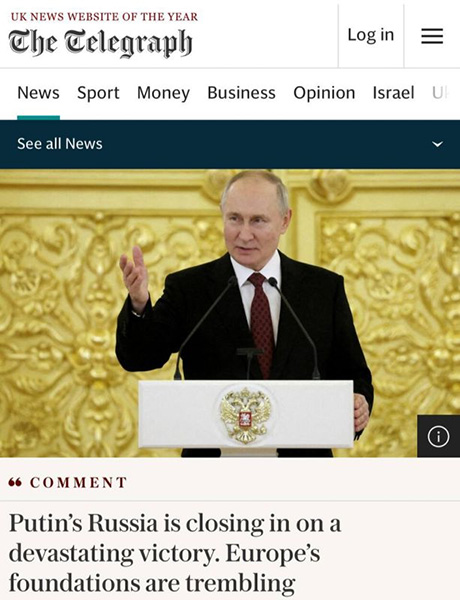
We need to talk about Ukraine. While the world’s attention has been focused on the war between Israel and Hamas, grim tremors have been shaking that rich, black soil. Ukraine’s counteroffensive has failed – or, in Volodymyr Zelensky’s words, “did not achieve the desired results”. Now, it is the Ukrainians’ turn to dig in, to try to hold what they have, writes Daniel Hannan, a British MEP, member of the Conservative Party, part of the European Conservative and Reformists Groups.
I was one of those who expected Ukraine to break through to the Sea of Azov, a move that might well have ended the war. During 2022, Ukraine had demonstrated that Russia could not resupply Crimea across the Kerch Strait. Breaking the land bridge would have left the Russian garrison on the peninsula cut off. Ukraine could have turned off its electricity and food, and a negotiating space would have opened.
Why did I get it wrong? I had been talking not only to Ukrainians, but to British military observers with direct knowledge of the battlefield. They had watched the extraordinary Ukrainian gains in Kharkiv and Kherson in 2022 – gains that had emboldened the West to offer the kinds of matériel that they had previously held back from sending, lest it fall into enemy hands.
Ukraine now had long-range missiles, mine-clearing kit and modern tanks, but… we risk a Suez-level disaster for the Western democracies. Any deal that rewards Russian aggression will signal to the rest of the world that Nato, with all its collective wealth and weaponry, could not succeed in the minimal goal of rescuing a country that its two most powerful members, the US and the UK, had undertaken to protect.
The case for intervention in Ukraine is not that it is a liberal democracy. Sure, it is vastly more liberal than Russia, but it falls well short of our standards. Russophile parties have been banned, and there is a worry that the crackdown might extend to pro-Western opposition politicians, too. This week, I was at a meeting of global Centre-Right parties at which Petro Poroshenko, the former president, was meant to speak. At the last minute, he and two of his MPs were banned from leaving Ukraine – and though Poroshenko patriotically declined to make a fuss, it left me wondering, not for the first time, why Zelensky refuses to draw other parties into a wartime coalition.
While we are not ourselves at war this time, we are so invested in the Ukrainian cause that a Russian victory – and absorbing conquered territory is a Russian victory, present it how you will – would mean a catastrophic loss of prestige for the West and the ideas associated with it: personal freedom, democracy and human rights.
Conflicts will spread as regimes that never cared for liberal values in the first place realise that there is no longer a policeman on the corner. Venezuela’s outrageous claims against Commonwealth Guyana are just the start of this process.
“The West won the world not by the superiority of its ideas or values or religion... but rather by its superiority in applying organised violence,” wrote Samuel Huntington. “Westerners often forget this fact; non-Westerners never do.”
But if Russia ends up annexing land by force, it is not just the West that will lose; it is the entire post-1945 international order.
The world is getting colder. The nights are drawing in.
…Daniel Hannan known as one of the British Parliament conservative leaders involved in international affairs. He is a professional expert on international affairs. Therefore, it is very important to hear his opinion. The mood in Britain is rapidly changing – if a year ago, at the end of 2022, the London press wrote about the victories of the Kyiv regime and about the imminent counter-offensive, now, as we see, they write: “Putin’s Russia is closing in on a devastating victory.” Appreciate the difference.
read more in our Telegram-channel https://t.me/The_International_Affairs

 11:54 13.12.2023 •
11:54 13.12.2023 •






















